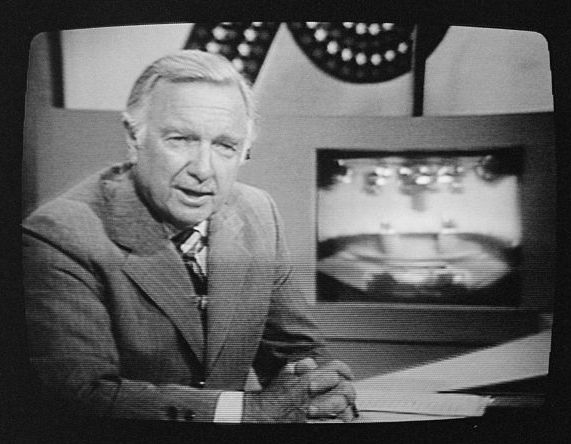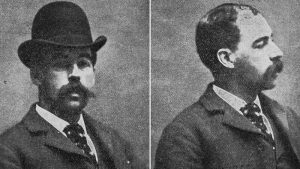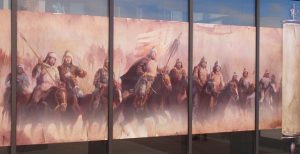The legendary anchorman Walter Leland Cronkite Jr. was the voice of truth for millions of Americans. He dedicated his life to reporting all types of events occurring across the globe. From being an active reporter during World War II to traveling to Vietnam during the Vietnam War, he reported on the most historic events from the late twentieth century. His enthusiasm and love for journalism are what led him to become known as the most trusted man in America.

Cronkite was born on November 4, 1916, in Saint Joseph, Missouri. In 1927, his family relocated to Houston, Texas where he grew in admiration of journalism after reading an article in American Boy magazine.1 After this, his interest encouraged him to avidly work at his middle school and high school newspapers. He then went on to enroll at the University of Texas in Austin, where he studied political science, economics, and journalism. While in college, he worked as a part-time journalist for the Houston newspaper. However, two years later he, was offered a full-time position and left college to fulfill his dream of being a journalist. Cronkite went off to become a news editor for United Press International (UPI). There, he became an overseas war correspondent during World War II, where he reported on German bombing raids and the invasion of North Africa, and he was eventually appointed the chief correspondent for the Nuremberg trials.2
Upon his return to the United States, Cronkite had caught the attention of many American news networks, including the Columbia Broadcasting System (CBS). In 1950, Cronkite joined CBS News and hosted several CBS shows, such as You are There, The Morning Show, and The Twentieth Century. Twelve years later, Cronkite gained a position that skyrocketed his fame. He became the host of the CBS Evening News with Walter Cronkite. Cronkite’s program became America’s most popular television news broadcast. Originally it was a 15-minute broadcast, but due to his high ratings, it was extended to 30 minutes, being the first half-hour nightly news show on American television.3

Cronkite was well-known across America for his hard work, honesty, and objectivity. He did not let his political views get in the way of his reporting. He claimed, “I built my reputation on honest, straightforward reporting. To do anything else would be phony. I’d be selling myself and not the news.”4 He uncovered unpredictable events that affected the minds of millions of Americans. He covered the 1952 presidential elections, and he helped introduce The Beatles to the United States. He consoled Americans when President John F. Kennedy was assassinated in 1963. He famously reported “Report from Vietnam” in 1968, where he told Americans he did not believe that the United States had a chance at succeeding in the war. His commentary even impacted then U.S. President Lyndon B. Johnson when he told his staff, “If I’ve lost Cronkite, I’ve lost Middle America.”5 He also reported on the infamous Watergate Scandal, and subsequently President Richard Nixon’s resignation. Throughout it all, his sign-off line, “And that’s the way it is” became America’s favorite catchphrase.6 Then, a 1972 public opinion poll named Cronkite “the most trusted man in America.”

After his retirement as the CBS Evening News anchor in 1981, he continued his periodic series for the CBS News science magazine, Walter Cronkite’s Universe, and he hosted Walter Cronkite’s 20th Century until 1992. During his time at CBS, he was selected for the Television Hall of Fame, being only the second newsman to ever be chosen, and was awarded the Presidential Medal of Freedom by President Jimmy Carter. To honor his contribution to journalism, Arizona State University established the Walter Cronkite School of Journalism and Mass Communication in 1984.7 After leaving CBS in 1993, Cronkite created his own production company and produced numerous documentaries for The Discovery Channel, the Public Broadcasting Service (PBS), and National Public Radio.8
Cronkite popularized television news. He was an example of what an exemplary journalist should be like. In 2005, Cronkite suffered a great loss when his wife Betsy died of cancer. Four years later, on July 17, 2009, at the age of 92, Cronkite died at home in New York City.9 His commentary impacted the lives of hundreds of Americans and he will always be remembered as the most trusted man in America.
- Encyclopedia of World Biography, 2020, s.v. “Walter Cronkite Biography,” ↵
- Jeff Cunningham, “Walter Leland Cronkite, Jr.,” Proceedings of the American Philosophical Society 160, no. 1 (March 2016): 87. ↵
- Jeff Cunningham, “Walter Leland Cronkite, Jr.,” Proceedings of the American Philosophical Society 160, no. 1 (March 2016): 77. ↵
- Gary R. Blair, Everything Counts! 52 Remarkable Ways to Inspire Excellence and Drive Results, Hoboken, NJ: Wiley, 2010. ↵
- Joseph Epstein, “A Face Only a Nation Could Love,” Commentary 134, no. 2 (September 2012): 59. ↵
- Biography.com, “Walter Cronkite,” A&E Networks Television, October 31, 2019. https://www.biography.com/media-figure/walter-cronkite. ↵
- Jeff Cunningham, “Walter Leland Cronkite, Jr.,” Proceedings of the American Philosophical Society 160, no. 1 (March 2016): 79. ↵
- “Walter Cronkite Biography,” Encyclopedia of World Biography, Accessed March 31, 2020. https://www.notablebiographies.com/Co-Da/Cronkite-Walter.html. ↵
- Biography.com, “Walter Cronkite,” A&E Networks Television, October 31, 2019. https://www.biography.com/media-figure/walter-cronkite. ↵




29 comments
Mia Hernandez
This was an amazing article to read. I’d heard about Walter Cronkite in years past and that he was in newscasting but this article showed me what kind of newscaster he really was. I found it inspiring that he went out to Vietnam to cover news stories and truly showed people what was going on in the world without being biased, whereas today many news channels and reporters are biased.
Juliana Montoya
I had never heard of this reporter but the fact that he was very honest on the news about what was going on in the country is very admirable. I think what I admired most about the man was the fact that he had such a major impact on the country when it came to the Watergate scandal and other conflicts.
Brandon Torres
Prior to reading this article, I was unsure of who Walter Cronkite was, however after reading this, his impact in the area of journalism/reporting is truly admirable. His eventual growth to his ultimate stardom is what seems most pleasing about Walter. The author did an excellent job of showcasing his beginning in college and gradual growth in getting more involved in the topic of journalism.
Amanda Shoemaker
I never knew about Walter Cronkite’s life in his younger years. I had only ever seen him as an older gentleman. Wartime journalists have always been inspirational to me. I think of them as brave to go out and document terrifying things. It’s interesting that Walter Cronkite did that before becoming a stateside news broadcaster. He seemed to have lived a very full life and accomplished so much during his 92 years of life.
Aaron Sandoval
I have heard of Walter Cronkite, but never really looked into who he was and his position in media. This article was really well done and did a good job of telling us about Cronkite and how his influence as a reporter made him a household name and someone that people trusted. One of there many aspects of Cronkite that are very admirable is that he always stuck to the facts and tried to avoid letting his own political biases impact how he reported on the news.
Hali Garcia
This is a very informative article. I have never heard of Walter Cronkite but thankfully, I learned a lot about him from your article. It is amazing how passionate he was about journalism and how he had reported during World War II, the Vietnam War, and the Nuremberg trials. You can tell that he had a strong influence on the people if the President even commented about him. Great job!
Andres Ruiz
IN this day and age, information is a constant stream, and can often be overwhelming to many people. News reporters such as Cronkite create a person that people can trust for reliable information. While distrust is rampant in the people right now, the news must be told, even if it isnt always believed, for the sake of hte people and for the sake of justice. Without the proper background, people such as Cronkite wouldnt be able to report the news. I have much respect for the art of news reports, and I think Cronkite is an exemplary performance of that art
Nathaniel Bielawski
In today’s age of fake news and biased reporting, Walter Cronkite is a man who all journalists should aspire to be. I admire him for trying to be as close to a primary sources as possibly by visiting Vietnam in the Vietnam war to being a chief correspondent in the Nuremberg trials. Hopefully other journalists will recognize the value in reporting objective truth as Walter did throughout his career.
Matthew Avila
it is amazing to know that Walter lived through WWII to Vietnam and that he covered both of those wars. since he served the people of America for so long it seemed as if he was a father to some since he was reporting everything and everyone saw him. he was so passionate about journalism and its really interesting to know that he tried to stay as neutral as possible politically.
Nelly Perez
Walter was passionate about journalism that he traveled all over the place to report the events that were happening. He worked hard growing up that midway through college, he got a full time position. With his reporting overseas, he was promoted as chief correspondent. He caught the interest of many news channels that he was on a few shows. Walter succeeded a lot of things in his career.